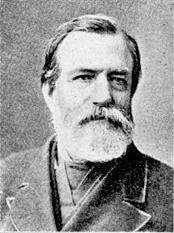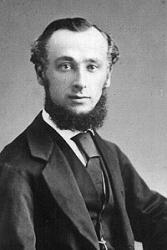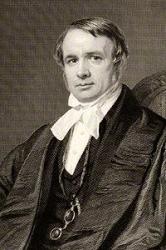1809 - 1899 Person Name: Victor von Strauss Hymnal Number: d493 Author of "Thou, sore oppressed, the day of rest" in Christian Hymnal Strauss, Victor Friedrich. von, was born at Bückeburg, Schaumburg-Lippe, Sept. 18, 1809. He became a student of law at the Universities of Erlangen, Bonn, and Gottingen. In 1832 he married Albertine von Torney, daughter of a Hannoverian landed proprietor; and, in 1872, at the request of her relations, added her name to his own (Strauss und Torney), having been previously, in 1851, raised to the Austrian nobility. Having entered the diplomatic service of Schaumburg-Lippe, in 1832, he was appointed, in 1840, Archivrath at Bückeburg; and attended the Frankfurt Diet as Geheimrath, in 1850, as the accredited representative of Schaumburg-Lippe. He was also, from 1853 to 1866, the regular representative of Schaumburg-Lippe, at the North German Diet. Thereafter he retired on a pension, and went at Easter, 1869, to Erlangen, where he wrote a translation of the works of the Chinese philosopher Laò-tsè, with a commentary (published 1870). In 1872 he removed to Dresden. In 1889 he published the first vol. of a work on Altägyptische Götterglaube (Koch, vii. 270; 0. Kraus, 1879, p. 525, &c).
Both as a secular and as a sacred poet, Strauss holds high rank among his contemporaries in Germany; not so much for popularity, as for wealth of ideas, breadth of culture, beauty of form, and clear, simple expression. The impulse which he received to the study of theology and to hymnwriting, was mainly through the impression of manifest unfairness left upon him by reading D. F. Strauss's Leben Jesu, 1835. This led him to study the New Testament for himself; and to find, in the old Gospel, the satisfaction of the needs of his spirit. His hymns, while, like most modern hymns, in the main subjective, often catch the ring and noble simplicity of the older objective classical hymns, but are more finished in form. Many have passed into recent German hymnbooks. They appeared principally in Knapp's Christoterpe, 1844-48; and in his own—(1) Gedichte, Bielefeld, 1841; (2) Lieder aus der Gemeine für das Christliche Kirchenjahr, Hamburg, 1843 ; and (3) Weltliches und Geistliches, Heidelberg, 1856. The hymns in No. 3 are in the second part, which is separately paged, and en¬titled Geistliches im Gedichten und Liedern. The work entitled Das Kirchenjahr im Hause, Heidelberg, 1845, is a series of poetical meditations, and not of hymns properly so called.
The hymns by Strauss which have passed into English are:—
i. Lobjauchzt und mehret Gottes Ruhm. Advent. First published in 1856, as above, pt. ii., p. 8, in 16 stanzas, entitled "Advent." Translation as, "The Lord doth in His Kingdom come." By J. Kelly, 1885.
ii. Nun gingst auch du. Easter Eve. First published, 1843, as above, p. 126, in 7 stanzas of 5 lines, and en¬titled, "The Lord in the Grave." Included in Knapp's Evangelischer Lieder-Schatz, 1850, No. 560. Translated as:—
Thou sore-oppress'd. A good translation, omitting st. v. by Miss Winkworth, in herLyra Germanica, 2nd Ser., 1858, p. 34; and thence in her Chorale Book for Eng¬land, 1863, No. 56. Included in the Hymnary, 1872, Parish Hymn Book, 1875, Evangelical Hymnal, N. York, 1880, and others.
iii. 0 mein Herz, gieb dich zufrieden. Waiting on God. First published, 1841, as above, p. 160, in 5 stanzas of 8 lines, and entitled, "Tranquillity." Included in Knapp's Evangelischer Lieder-Schatz, 1850, No. 1955. The translation in common use is:—
0 my heart, be calm and patient. A translation of st. i., ii., v., by Miss Borthwick, as No. 243 in Dr. Pagenstecher's Collection, 1864.
Other translations are:—
(1) "0 my heart, be calm, confiding." By Miss Burlingham, in the British Herald, June 1866, p. 287; and in Reid's Praise Book, 1872. (2) "O my heart, be thou content." By J. Kelly, 1885, p. 75. [Rev. James Mearns, M.A.]
-- John Julian, Dictionary of Hymnology (1907)
Victor von Strauss und Torney


 My Starred Hymns
My Starred Hymns







